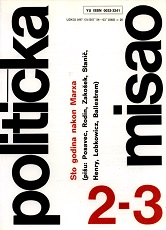Građanske teorije međunarodnih ekonomskih integracija
Bourgeois Theories of International Economic Integration
Author(s): Vlatko MiletaSubject(s): Politics / Political Sciences, Political Theory, Inter-Ethnic Relations
Published by: Fakultet političkih znanosti u Zagrebu
Keywords: Bourgeois Theories; International Economic Integration;
Summary/Abstract: Integration processes in the international economic community may be studied through political relations, as done in political theories of integration, or through economic relations, as done by economic theories of integration. Naturally, take economics as their main subject. The political theories of integration may be divided into functionalistic, neofunctionalistic, pluralistic and federalist schools. They all have in common a concern with the functions of the state in the promotion of economic integration and the effects of this integration on the functioning of the state. The economic theories of integration comprise a liberalistic and an institutional tendency, as well as a kind of -transitional- theoretical tendency from liberalism towards institutionalism. The representatives of the liberalistic tendency consider that economic integration may be achieved through free international trade, which integrates a given region by its very operation. Hence, no supranational institutions are needed to effect integration. States retain their full economic sovereignty. However, faced with state intervention in economic life, and hence with the violation of the liberal principles governing the economic order, the exponents of the liberalistic tendency modify their original concepts in the direction of the so-called "regional liberalism". The converse views are upheld by institutionalists. They believe that economic integration is not possible in an economy founded on liberal principles except by the co-ordination of economic policies of individual countries and by global development planning. This, in turn, requires the establishment of special international institutions with supranational powers.
Journal: Politička Misao
- Issue Year: XX/1983
- Issue No: 02+03
- Page Range: 113-126
- Page Count: 14
- Language: Croatian

